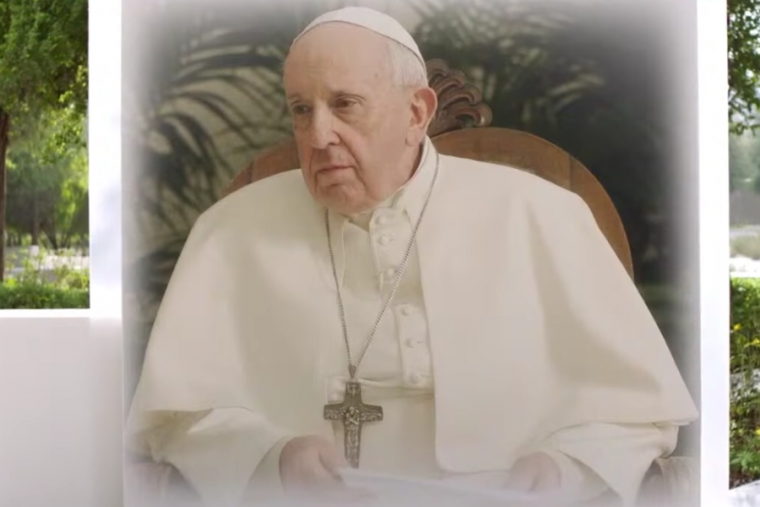Pope Francis delivers his International Day of Human Fraternity message Feb. 4, 2021. Screengrab from Vatican YouTube channel.
Human fraternity is “the challenge of our century,” Pope Francis said yesterday, as he marked the first International Day of Human Fraternity together with the Grand Imam of al-Azhar, Ahmed el-Tayeb.
“Either we are brothers, or, allow me to say, everything will fall apart,” the pope said during an online event yesterday. “This is the challenge of our century. It is the challenge of our times.”
Francis spoke about the importance of human fraternity during a 40-minute online meeting organized by the Higher Committee for Human Fraternity in collaboration with the Vatican’s Pontifical Council for Interreligious Dialogue.
“Fraternity means to lend a helping hand. Fraternity means respect. Fraternity means listening with an open heart. Fraternity means defending our own convictions because there is no true fraternity if one’s own convictions have to be negotiated,” the pope said.
The United Nations General Assembly has designated 4 February as the International Day of Human Fraternity. The date was chosen because it marks the anniversary of the signing of the Document on Human Fraternity for World Peace and Living Together. The text was signed by Pope Francis and the Grand Imam of al-Azhar on the pope’s trip to Abu Dhabi in the United Arab Emirates in 2019.
“This celebration responds to a clear call that Pope Francis has been making to all humanity to build a presence of peace in the encounter with the other,” Cardinal Miguel Ángel Ayuso Guixot said before the event.
Ayuso, president of the Pontifical Council for Interreligious Dialogue, said, “these meetings are a way to achieve true social friendship, as the Holy Father asks of us.”
Speaking after Ahmed el-Tayeb, Pope Francis emphasized that “either we are brothers or we destroy each other. There is no time for indifference now.”
“A world without brothers is a world of enemies,” he continued. “I would like to underline this. We can’t say ‘brothers or not brothers.’ We have to say ‘brothers or enemies’ because the difference is a very subtle form of enmity.”
“We do not need to be at war to be enemies. Disregarding each other is enough…” he said.
During the event, António Guterres, Secretary-General of the United Nations, and Latifa Ibn Ziaten, a French-Moroccan activist, were given the Zayed Award for Human Fraternity.
The two were chosen for the award by an independent jury established by the Higher Committee for Human Fraternity.
Ibn Ziaten is a Muslim and the mother of Imad Ibn Ziaten, the first service member killed by Mohammed Merah during a series of Islamist terrorist attacks he committed in Toulouse and Montauban, France, in 2012.
After the death of her son, Ibn Ziaten created the Imad Ibn Ziaten Youth Association for Peace to support young people from poor areas and promote interreligious dialogue.
Pope Francis praised Ibn Ziaten’s strength and the “conviction embodied in pain, in your wounds.”
“Only a mother knows what it is to lose a child,” he said. “Through your pain, you bring yourself to say, ‘we are all brothers,’ and to sow seeds of love. Thank you for your testimony and thank you for being a mother to your son and to so many boys and girls. For being a mother of this humanity that is listening and learning from you the path of fraternity.”
The pope also addressed Guterres, thanking him for his efforts towards building peace. “We will only achieve peace with a fraternal heart. Thank you for what you are doing,” he said.
Guterres has been U.N. Secretary-General since 2017. He served as Prime Minister of Portugal from 1995 to 2002 and U.N. High Commissioner for Refugees from 2005 to 2015.
A Catholic, Guterres recorded a video message with Pope Francis in December 2019, in which the two leaders underlined the importance of religious freedom, human dignity, and environmental protection.
Source: CNA

